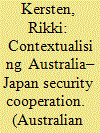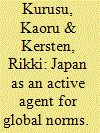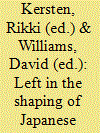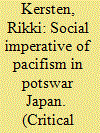| Srl | Item |
| 1 |
ID:
143908


|
|
|
|
|
| Summary/Abstract |
On July 1, 2014, Prime Minister Shinzō Abe's cabinet commenced a historic transformation of post-war Japan's security policy by overturning previous interpretations of the constitution's pacifist clause, Article 9. The Cabinet Decision on the Development of Seamless Security Legislation to Ensure Japan's Survival and Protect Its People stated that collective self-defence was consistent with the constitution and, consequently, Japan would immediately develop a more proactive and less constrained security policy. But while this outcome may seem sensible and overdue from a realist perspective of Japan's standing as a mature democratic nation in an increasingly difficult geopolitical situation, the manner in which it is being enacted may seriously undermine the normative legitimacy of Japan's new security identity. In this article, the author examines how Shinzō Abe's administration has attempted to shape the norms surrounding security policy revision in Japan, and how these norms, in turn, have affected or constrained Abe's agency. This is done with specific reference to the external contexts of the USA's ‘rebalance’ policy and the deepening of Japan's security relationship with Australia, with a view to anticipating how normative turmoil might impact on the potential of this relationship.
|
|
|
|
|
|
|
|
|
|
|
|
|
|
|
|
| 2 |
ID:
110902


|
|
|
|
|
| Publication |
2011.
|
| Summary/Abstract |
Japan has shaped a distinct human security policy based on evolving policy preferences of successive domestic political leaders and the gradual assimilation of external norms into its own foreign policy. Independent experts have played a particularly significant role in advising Japanese policy elites on how human security could be used by Japan to become an "intellectual leader" within the United Nations and other relevant institutions. This article explores those processes that occurred in the early phase of norm acceptance on the part of key Japanese policy actors and change agents in Japan from the late 1990s through 2003. It argues that human security has served as an effective approach for Japan to establish itself as a more independent foreign policy actor in contemporary international politics.
|
|
|
|
|
|
|
|
|
|
|
|
|
|
|
|
| 3 |
ID:
067058


|
|
|
|
|
| Publication |
London, Routledge, 2005.
|
| Description |
xviii, 183p.
|
| Series |
Routledge/Leiden series in modern East Asian history and politics; 2
|
| Standard Number |
0415334349
|
|
|
|
|
|
|
|
|
|
|
|
Copies: C:1/I:0,R:0,Q:0
Circulation
| Accession# | Call# | Current Location | Status | Policy | Location |
| 050895 | 320.513095209045/KER 050895 | Main | On Shelf | General | |
|
|
|
|
| 4 |
ID:
073642


|
|
|
|
|
| Publication |
2006.
|
| Summary/Abstract |
Postwar Japanese history is often analyzed from the perspective of peace and democracy. Both ideas represented an interpretation of the war experience on the part of postwar progressive thinkers that saw postwar pacifist activism assume an anti-State character. But another important part of this intellectual context was its pro-society inclination. Social agency and autonomy became the main objectives of postwar progressive thinking, and it was this that drove the intellectual activism and advocacy of postwar pacifist movements. But how did intellectuals conceptualize society, and what were the consequences of this conceptualization for the actual development of pacifist movements? Through examining the intellectual leadership of postwar pacifist movements we can begin to appreciate how the peace-democ-racy paradigm actually worked. A pioneering thinker in this respect was Shimizu Ikutar?, who was a central figure in Japanese pacifism in the 1950s, and a leading activist in the first anti-base movement at the village of Uchinada in 1953-54. It was in the context of this movement that Shimizu developed and articulated his ideas about society and peace. In the process, he revealed the dissonance in his thinking concerning "commoners," and commenced his own intellectual disintegration as a progressive thinker. The consequences of the Uchinada protest for postwar popular and intellectual movements for peace would be formative, eventually leading to the cataclysm of the failed anti-security treaty movement of 1960.
|
|
|
|
|
|
|
|
|
|
|
|
|
|
|
|